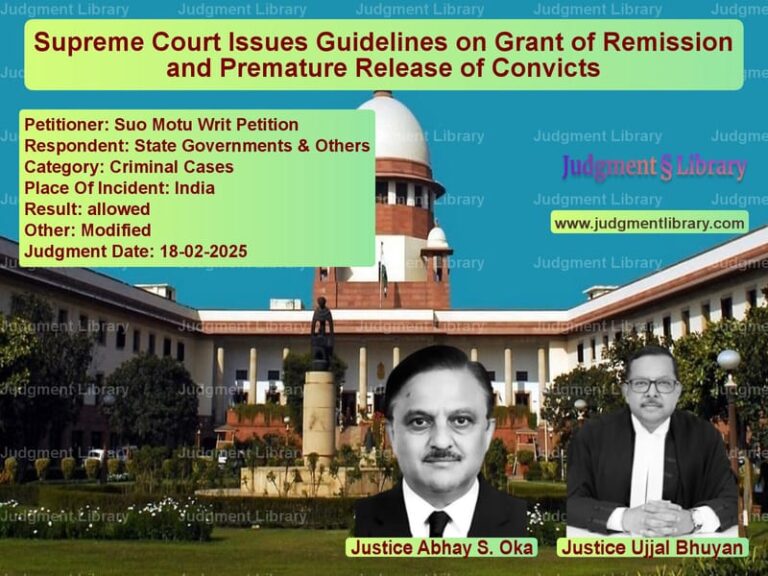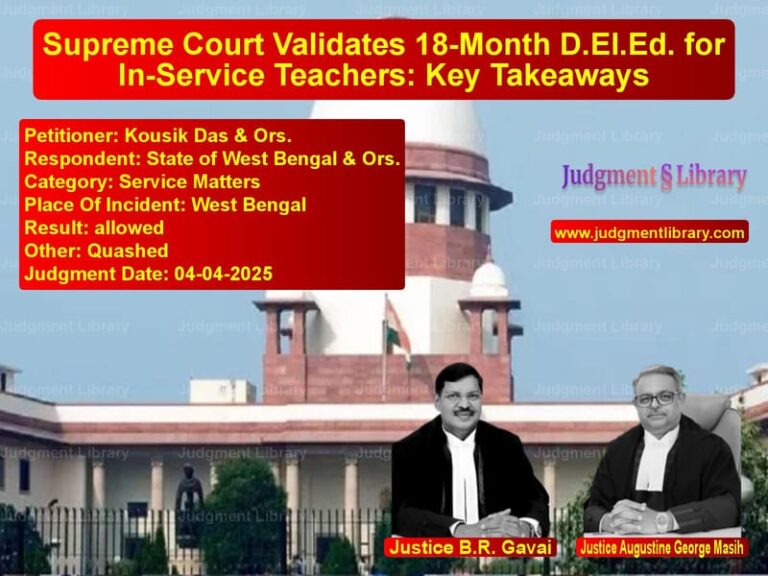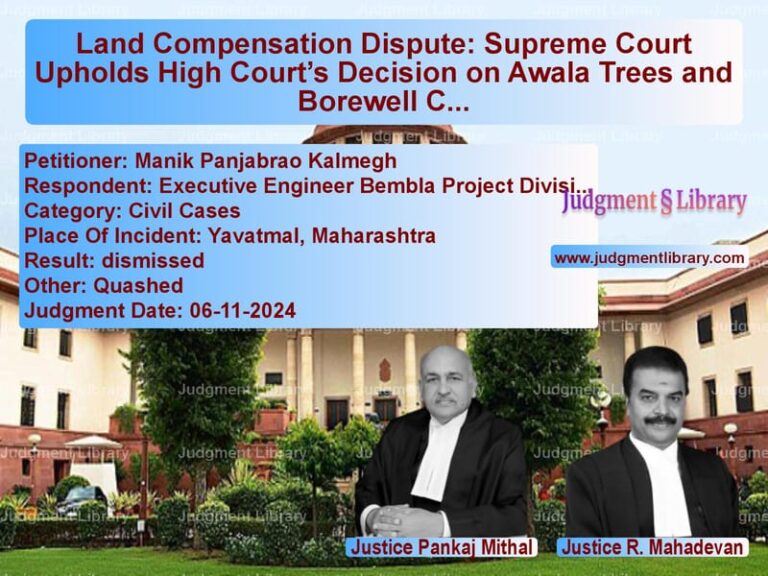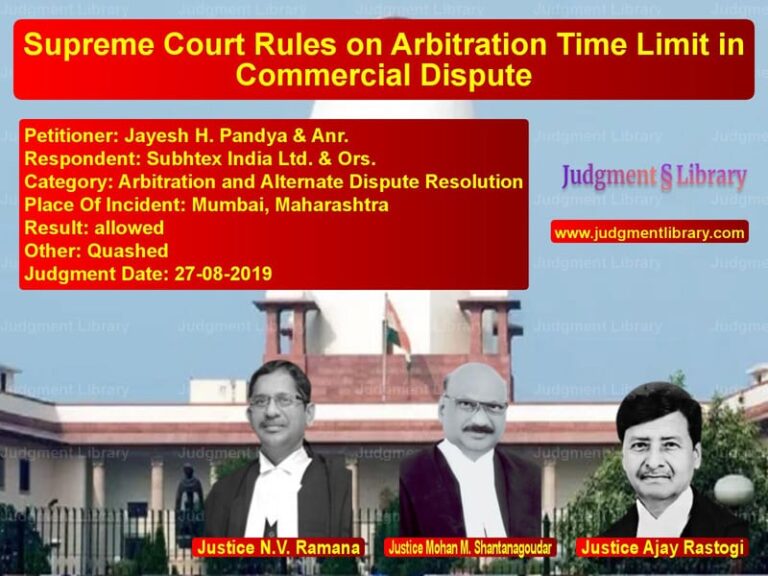Supreme Court Reinstates Assistant Professor in Yoga Therapy After Disqualification Challenge
The case of Dr. Sridip Chatterjee vs. Dr. Gopa Chakraborty & Ors. revolves around the appointment of an Assistant Professor in Physical Education (Yoga Therapy) at Jadavpur University. The Supreme Court, in its judgment dated 6th August 2019, reinstated the appellant after ruling that his qualification met the eligibility criteria. The case highlights the importance of expert opinions in academic recruitments and judicial restraint in interfering with selection processes.
Background of the Case
Jadavpur University published an advertisement on 22nd November 2012, inviting applications for the post of Assistant Professor in Physical Education (Yoga Therapy). The required qualification was:
“Master’s in Yoga/Yoga Therapy or Master’s in Physical Education with Post Graduate Diploma in Yoga/Yoga Therapy with at least 55% marks.”
The appellant, Dr. Sridip Chatterjee, applied for the position and was selected on 28th March 2013. However, Dr. Gopa Chakraborty, a competing candidate, challenged his appointment, arguing that he did not possess the required qualification.
Key Issues in Dispute
- Whether the appellant’s qualification was equivalent to the eligibility criteria mentioned in the advertisement.
- Whether the selection process followed by Jadavpur University was legally valid.
- Whether courts should interfere in expert decisions in academic recruitment.
Arguments by the Petitioner (Dr. Gopa Chakraborty)
- The appellant did not possess a Post Graduate Diploma in Yoga or Yoga Therapy, but instead had a Post Graduate Diploma in Yoga Education.
- The university erred in treating the appellant’s qualification as equivalent to the required eligibility criteria.
- The selection process lacked transparency, and the Equivalence Committee was formed only after the case was challenged.
Arguments by the Respondents (Jadavpur University and Dr. Sridip Chatterjee)
- The Equivalence Committee of the university found that the appellant’s qualification met the eligibility criteria.
- The Selection Committee, consisting of subject experts, had deemed the appellant qualified.
- The university was within its rights to assess and equate qualifications from different institutions.
- The High Court’s intervention in academic recruitment was unjustified.
Supreme Court’s Observations
1. Validity of the Appellant’s Qualification
The Supreme Court ruled that the Equivalence Committee, formed by the university, had the authority to determine whether the appellant’s qualification was equivalent. The Court noted:
“The condition of the advertisement was Post Graduate Diploma in Yoga or Yoga Therapy. The appellant possessed a Diploma in Yoga Education, which was found equivalent by the expert committee.”
2. Expert Authority in Academic Matters
The Court emphasized that universities and expert bodies are better placed to decide qualification equivalency, not courts. It stated:
“In the absence of mala fide intent, courts should not interfere with academic expert decisions regarding recruitment and qualification equivalency.”
3. Judicial Review in Recruitment Cases
The Court reaffirmed its stance that judicial review should not substitute the opinion of subject matter experts. It held:
“If a selection committee, comprising domain experts, has determined that a candidate meets the eligibility criteria, courts should be slow in interfering with such decisions.”
Final Verdict
- The Supreme Court set aside the Calcutta High Court’s ruling.
- The appellant, Dr. Sridip Chatterjee, was reinstated as Assistant Professor.
- He was granted seniority and pay fixation but not back wages.
Implications of the Judgment
- Strengthens the authority of universities and expert bodies in assessing qualification equivalency.
- Limits judicial intervention in academic recruitment unless clear procedural violations occur.
- Provides clarity on how equivalency committees should function in higher education institutions.
- Ensures fairness in recruitment while maintaining institutional autonomy.
Conclusion
The Supreme Court’s decision reinforces the principle that academic decisions should primarily be left to expert bodies rather than courts. By reinstating the appellant, the judgment ensures that qualified candidates are not unjustly disqualified based on technical interpretations. The ruling sets a precedent for future disputes over qualification equivalency in university recruitments.
Petitioner Name: Dr. Sridip Chatterjee.Respondent Name: Dr. Gopa Chakraborty & Ors..Judgment By: Justice L. Nageswara Rao, Justice Hemant Gupta.Place Of Incident: West Bengal.Judgment Date: 06-08-2019.
Don’t miss out on the full details! Download the complete judgment in PDF format below and gain valuable insights instantly!
Download Judgment: Dr. Sridip Chatterje vs Dr. Gopa Chakraborty Supreme Court of India Judgment Dated 06-08-2019.pdf
Direct Downlaod Judgment: Direct downlaod this Judgment
See all petitions in Recruitment Policies
See all petitions in Public Sector Employees
See all petitions in Judgment by L. Nageswara Rao
See all petitions in Judgment by Hemant Gupta
See all petitions in allowed
See all petitions in Reinstated
See all petitions in supreme court of India judgments August 2019
See all petitions in 2019 judgments
See all posts in Service Matters Category
See all allowed petitions in Service Matters Category
See all Dismissed petitions in Service Matters Category
See all partially allowed petitions in Service Matters Category







